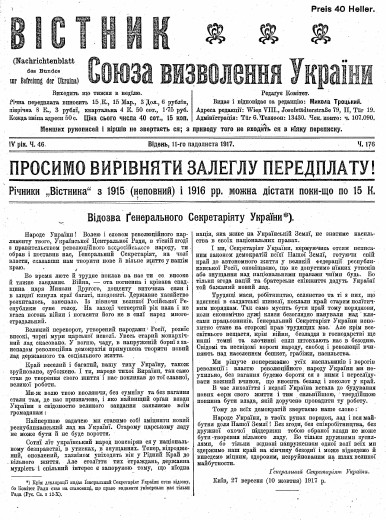Union for the Liberation of Ukraine
Union for the Liberation of Ukraine (Soiuz vyzvolennia Ukraïny, or SVU). An organization of Ukrainian émigrés from the Russian Empire established in Austria-Hungary and Germany during the First World War as an organization representing Ukrainians under Russian domination. Its members were mostly socialists from central Ukraine who had either fled or been deported to Austrian territory. They sought to use the war, in which Austria-Hungary and Germany were pitted against the Russian Empire in the east, as a means of securing Ukrainian independence. Ultimately they hoped to establish a constitutional monarchy with a democratic structure and a unicameral legislature in Ukraine.
The SVU's presidium, initially headed by Dmytro Dontsov and Mykola Zalizniak, consisted of Volodymyr Doroshenko, Mariian Melenevsky, Oleksander Skoropys-Yoltukhovsky, and Andrii Zhuk. It was assisted by various Galician and Bukovynian activists, including Ivan Krypiakevych, Bohdan Lepky, Mykhailo Lozynsky, Stepan Rudnytsky, Vasyl Simovych, Stepan Smal-Stotsky, Roman Smal-Stotsky, and Mykhailo Vozniak. The group was initially centered in Lviv, but moved to Vienna in August 1914. From its inception the SVU worked with the Supreme Ukrainian Council (after May 1915, the General Ukrainian Council) in Vienna, in which it was represented by Doroshenko, Skoropys-Yoltukhovsky, and Melenevsky.
The SVU undertook a wide-ranging campaign of distributing information and making representations to the Central Powers and neutral European nations. Its representatives were in Germany (Oleksander Skoropys-Yoltukhovsky), Turkey (Mariian Melenevsky), Bulgaria and Romania (Lev Hankevych), Italy (O. Semeniv), Sweden and Norway (Osyp Nazaruk), and Switzerland (P. Chykalenko). It published the journal Vistnyk Soiuza vyzvolennia Ukraïny (edited by Volodymyr Doroshenko, Mykhailo Vozniak, and Andrii Zhuk) and the weekly Ukrainische Nachrichten in Vienna and La Revue ukranienne in Lausanne. It also issued about 50 books and 30 brochures about Ukraine in German, French, English, Italian, Turkish, Swedish, Romanian, Croatian, Czech, and Bulgarian. Among the more important monographs it issued were Doroshenko's Ukraïnstvo v Rosiï (The Ukrainian Movement in Russia) and Pivtorasta lit ukraïns’koï politychnoï dumky (150 Years of Ukrainian Political Thought), Volodymyr Hnatiuk's Natsional’ne vidrodzhennia avstro-uhors’kykh ukraïntsiv (The National Revival of Austro-Hungarian Ukrainians), Ivan Krypiakevych's Ukraïns’ke viis’ko (The Ukrainian Military), Mykhailo Lozynsky's Halychyna v zhytti Ukraïny (Galicia in the Life of Ukraine), Stepan Rudnytsky's Ukraina, Land und Volk, Mykhailo Hrushevsky's Geschichte der Ukraine, and Volodymyr Temnytsky's Ukraïns’ki sichovi stril’tsi (The Ukrainian Sich Riflemen).
With the support of the Ukrainian community of Galicia and Bukovyna and the approval of the Austro-Hungarian and German military authorities the SVU provided medical, religious, and cultural services for Ukrainian prisoners of war of the Russian army held in prisoner of war camps in Austria (in Freistadt), Hungary (Duna-Serdagel), and Germany (Rastatt, Salzwedel, and Wetzlar). As a result of its efforts about 50,000 prisoners of war in Germany and 30,000 in Austria were provided with hospitals, schools, libraries, reading rooms, choirs, orchestras, theaters, and courses in political economics, co-operative management, Ukrainian history and literature, and German language. Various newspapers were established, including Rozsvit (printed in Rastatt), Vil’ne slovo (Salzwedel), Hromads’ka dumka (Wetzlar), Rozvaha (Freistadt), and Nash holos (Josefstadt). A number of educational brochures were also published.
In 1916 the SVU set up an office in Lviv, which established a private Ukrainian school system in those regions of Volhynia that had been occupied by Austria-Hungary. In the spring of 1917 the SVU organized a group of former Ukrainian prisoners of war to set up about 100 schools (for about 5,500 pupils) and established the newspaper Ridne slovo (1917–19) (Biała Podlaska) in Podlachia, a region controlled by the German army at that time.
With the outbreak of the February Revolution of 1917, the SVU declared that its mandate extended beyond the supervision of prisoners of war and the defense of Ukrainian territories under Austrian-Hungarian rule from Polish designs. As a result of SVU efforts two Ukrainian army divisions, the Bluecoats (under the German army, commanded by Viktor Zelinsky) and the Graycoats (under the Austro-Hungarians), were formed. They were later incorporated into the Army of the Ukrainian National Republic.
The SVU was initially criticized by other central Ukrainians for its collaboration with the Central Powers, but its activities gradually earned acceptance, particularly as a result of its publishing. The supporters of the Entente and various Russian émigrés (including Vladimir Lenin) were hostile to it. The journal Borot’ba, published by the Ukrainian Social Democratic party and edited by Lev Yurkevych in Geneva, was also critical. The SVU was formally dissolved on 1 May 1918.
BIBLIOGRAPHY
Pam’iatkova knyzhka SVU i kalendar na 1917 (Vienna 1917)
Terlets’kyi, O. Istoriia ukraïns’koï hromady v Rashtati 1915–1918 (Leipzig 1919)
Skoropys-Ioltukhovs’kyi, O. ‘Moï zlochyny,’ Khliborobs’ka Ukraïna, nos 2–4 (Vienna 1920–1)
Bihl, W. Österreich-Ungarn und der Bund zur Befreiung der Ukraina in Österreich und Europa (1965)
Hornykiewicz, T. Ereignisse in der Ukraine 1914–22, vol 1 (Philadelphia 1966)
Rozdol’s’kyi, R. ‘Do istoriï SVU,’ Ukraïns’kyi samostiinyk, 1969, nos 1–6
Fedyshyn, O. ‘The Germans and the Union for the Liberation of the Ukraine, 1914–1917,’ in The Ukraine: A Study in Revolution, ed T. Hunczak (Cambridge, Mass 1977)
Soiuz vyzvolennia Ukraïny, 1914–1918, Viden’ (New York 1979)
Arkadii Zhukovsky
[This article originally appeared in the Encyclopedia of Ukraine, vol. 5 (1993).]

